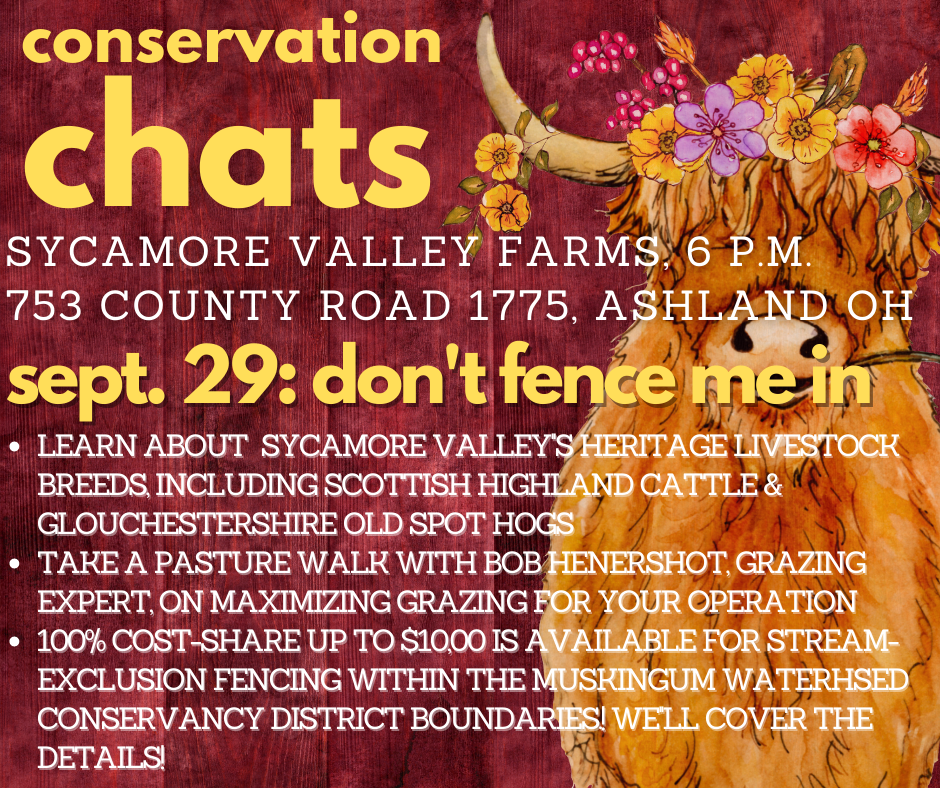Don't Fence Me In! Conservation Chat will take livestock producers back to school on good grazing practices
As we transition to back-to-school season, it’s not just school kids who are ready to learn. Livestock farmers from Ashland and surrounding counties can get schooled on maximizing their pasture’s productivity on September 29 at Ashland Soil and Water Conservation District’s (SWCD) Conservation Chat: Don’t Fence Me In.
The Conservation Chat will be hosted by Sycamore Valley Farms, Ashland SWCD’s 2020 Outstanding Cooperator of the Year. The event will include a pasture walk with Bob Hendershot, renowned grazing expert, who will talk to producers about how to utilize rotational grazing to maximize the profitability of their pastures.
Josh & Lindsey Welch of Sycamore Valley Farm are pictured with Lindsey’s father Denny Bittle at the 2020 Ashland SWCD Annual Meeting, where they were named 2020 Outstanding Cooperator.
“In rotaional grazing systems, you will find forage productivity is higher than in continuously grazed systems,” said Erica White, Jerome Fork watershed coordinator at Ashland SWCD. “Because the animal are limited to what plants are available in a rotational system, they will easy those ‘less desirable” plants or the ones that just don’t taste as good. We see much better plant utilization and those ‘favorite” for more tasty plants have the opportunity to thrive because they are not being overgrazed, which improves livestock productivity.”
Sycamore Valley has worked with Hendershot to utilize regenerative practices like rational grazing, and they have also installed livestock stream exclusion fencing through a cost-share program with the Muskingum Watershed Conservancy District that is administered through Ashland SWCD.
“The MWCD exclusion fencing program is partially funded by Fish and Wildlife, and it provides 100 percent cost share for up to $10,000 in exclusion fencing and complementary practices,” White said. “Not only do we see improvements in water quality with these projects, but we also see improvements in habitat. Once cattle are excluded from a stream, it opens up opportunities to strategically place watering systems in the paster that can improve livestock productivity.”
In fact, one of the biggest water quality concerns in Ashland County’s waterways is manure from livestock operations and pastures making its way into streams according to the Ohio EPA. Excluding streams from pasture environments can be a key step to reducing manure and bacterial in Ashland County waters.
White said participants in the Conservation Chat will have the opportunity to do a pasture walk with Hendershot and learn more about Sycamore Valley’s focus on preserving heritage livestock breeds and regenerative agricultural practices.
“Sycamore Valley Farms is owned and operated by Josh and Lindsey Welch, and the farm is what I like to call a ‘not-so-hidden gem’ in the county,” White said. “I say it’s ‘not-so-hidden” because the Welch family has really opened up their gates in full transparency to share their farm with hundreds of people on social media, really showing what real-life, sustainable farming looks like on a daily basis. The Welches have done a great job raising heritage breeds of beef, pork, and chickens through sustainable practices and helping to close the gap between farmers and consumers.”
For more information or to RSVP for the Conservation Chat: Don’t Fence Me In, contact White at 419-281-7645 or by e-mail at ewhite@ashlandcounty.org. Registeration is free, but advance registration is required to ensure enough supplies are on-hand for the event.


